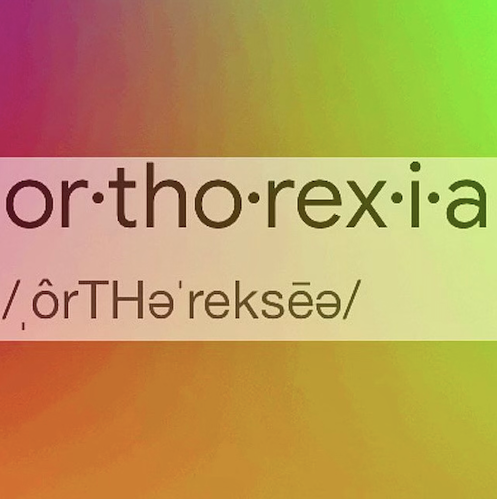Hello Ripe Fam - today we’re going to be discussing Orthorexia.
Trigger warning: for those of you that may be struggling with this disorder or have struggled with this disorder and would rather not get into the details. We respect you! We aren’t experts here. At no point do we wish for you to diagnose yourself based on our blog. If you are struggling, there are heaps of amazing clinics and professionals that have got your back. We love you - let’s do this.
Orthorexia Nervosa is an unhealthy focus on eating in a healthy way. Eating and thinking about nutritious food is amazing! Those with orthorexia, obsess about food to a degree that can damage their overall well-being. Unfortunately, this is a very common phenomenon in this day and age - but did you know that Steven Bratman, MD, a California doctor, coined the term in 1996? Our relationship with being healthy, “well” and "fit" is complex...sometimes even warped.
Let’s dive deeper.
Orthorexia is a disorder that is characterized by healthy eating habits that have been taken to dangerous levels. Orthorexia is recognized by many experts as a serious disorder that can cause significant physical and psychological distress.
In most cases, orthorexia starts as an honest attempt to live healthier. However, a person might start cutting foods out of their diet until they are only eating foods that have been prepared in particular ways. An individual with orthorexia will spend an exceptional amount of time thinking about food, which is similar to someone with anorexia or bulimia. It’s common that these individuals will obsessively read the back of packaged goods, and be riddled with anxiety because of this.
They might also obsess about the calories they are consuming, and grow overly concerned about the health benefits of these foods. They may also find themselves obsessing over how food has been processed and prepared. Those who have orthorexia are fixated on consuming food that will keep them healthy to a point where they will avoid foods that are necessary for their continued well-being.

Alex's Story (trigger warning):
Pre Ripe - I struggled with multiple eating disorders growing up mainly binge drinking and eating in my teens and early 20s. With time, the more positive reinforcement that I received from friends and peers on my weight loss, the more obsessed I became with eating healthy and losing weight.
It makes me sad to look back at how I thought I was in control and healthy, but I was really lost and hurting. I would beat myself up if I ate something that wasn’t “healthy”. I would skip social events and gatherings with friends so that I would not “over eat” or “be tempted to over eat”. I would do two a days at the gym to try to burn as many calories as possible and it was exhausting to tie my worth to my weight.
I used to research different ingredients for hours daily and read about all the benefits to talk myself into feeling okay about eating them. If I ate something that I felt guilty about, I would make myself throw up (I was diagnosed with bulimia, but for me they went hand in hand). I truly thought that this was the answer and how I would continue to live.
This extremely unhealthy, unrealistic journey took a huge toll on my adrenals and mental health. Years into these patterns, I realized that I was off balance and I needed healing. I came to a place of, “if I want to help other people as a nutritionist and health coach, then I need to get healthy and battle my own demons first.”
At that point in my life I didn’t have the resources or knowledge to know how to ask for help, so in Alex-nature, I self-soothed. I know I was lucky to move through this in the way that I did, and to come out on the other side.
I created a line of organic whole foods, infused with superfoods that helped me realize what health really is!
It started with creating items that made me feel safe and secure: clean and nourishing. And as I nourished and built trust with the foods around me, my gut healed, my mind healed and my soul healed.
Again, I know I was a lucky case. I know many don’t have the luxury I did to build a brand and heal with the brand, and some have dealt with much deeper situations. I’m not perfect. I definitely binge from time to time, but for the most part my healing has come from knowing that food is our friend and working out is a privilege and that it is not to be abused. This took a lot of time to look in the eyes.
I think it’s very important to be honest about our struggles with self-esteem, confidence, eating disorders, depression, and mental illness. I had multiple clients who I have consulted over the years who had this condition also unknowingly. We all struggle and a lot of us suffer in silence. I’m here to talk about it if you feel the need to reach out. Be balanced, seek support if you need it - you are your friend, food is your friend, never be afraid.
Eating disorder clinics and helplines:
National Eating Disorder Information Centre (NEDIC)
1 866 633-4220 (Toll free), 416 340-4156 (Toronto/ GTA)
North York General — Adolescent Eating Disorders Program Phillips House
SickKids – Eating Disorders Program ( click on “eating disorder” in the search bar)
416 813-7005
CAMH Concurrent Outpatient Medical & Psychosocial Addiction Support Services (COMPASS)
416 535-8501 (press 2)
Lakeridge Health – Eating Disorders Program
905 576-8711 ext. 34622

